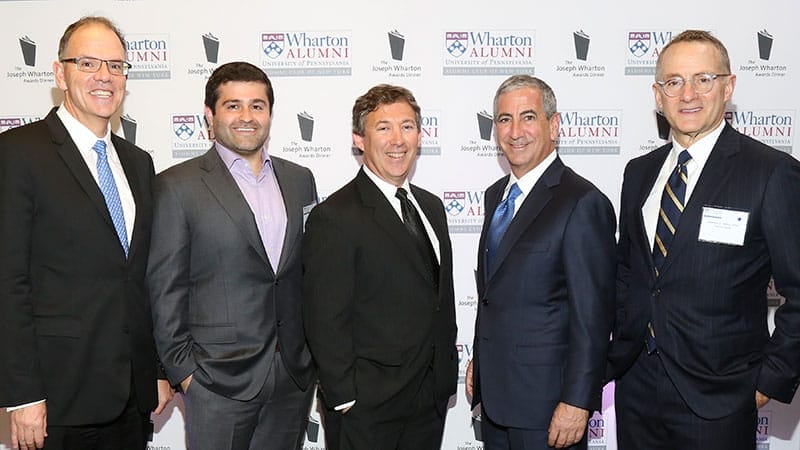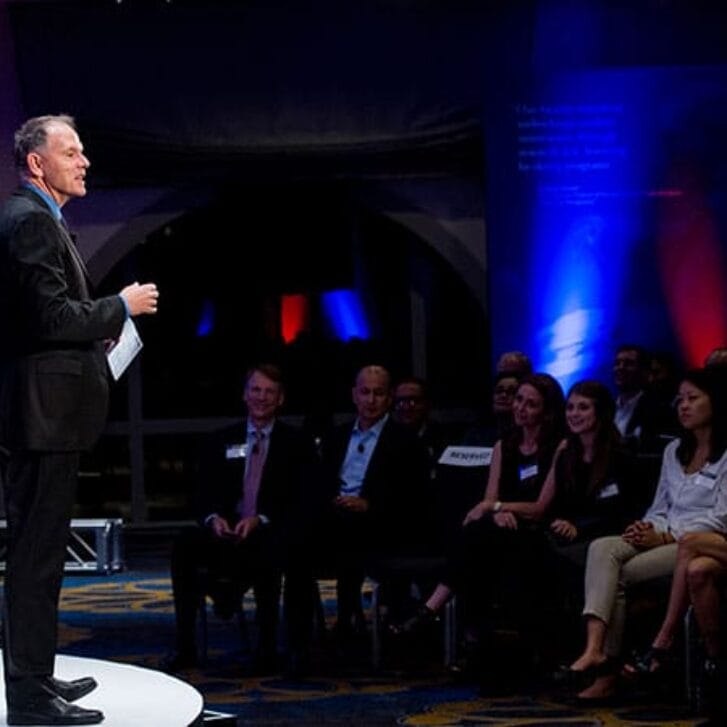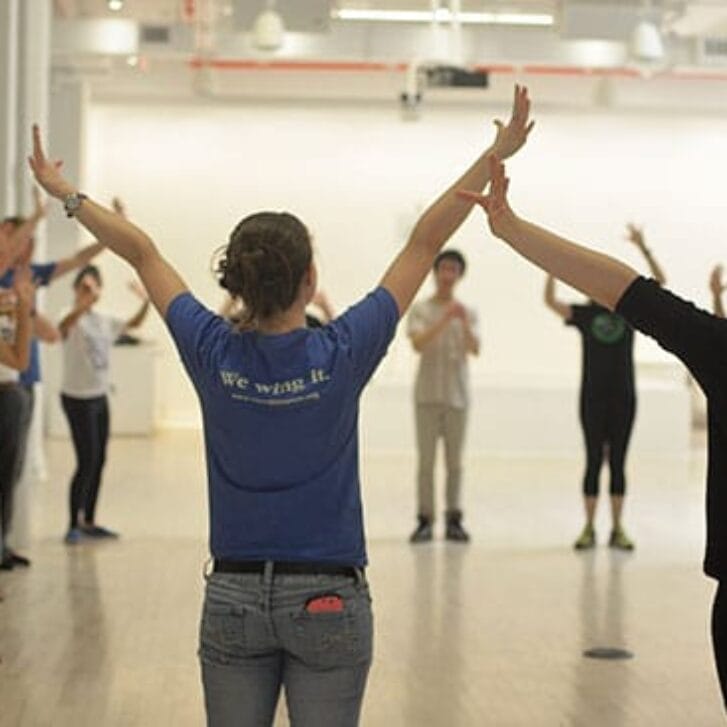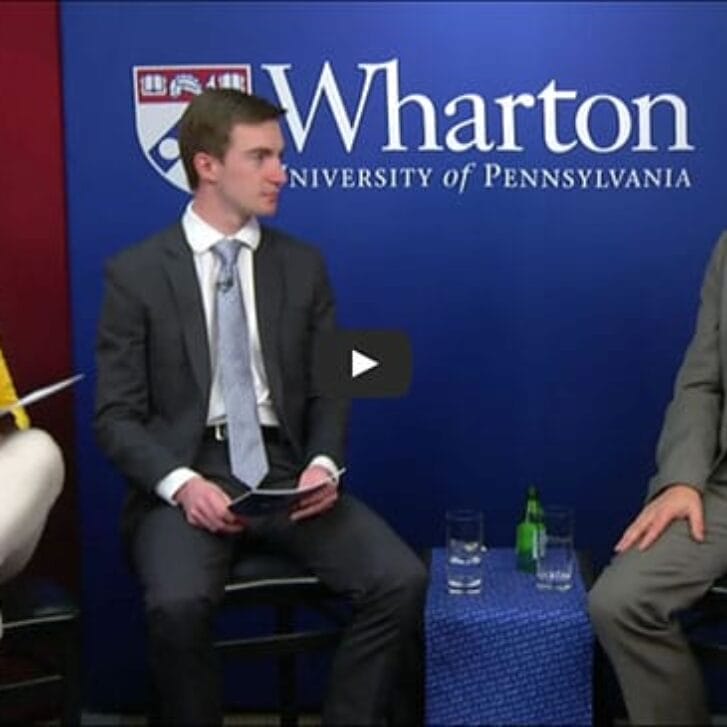The Wharton Club of New York’s (WCNY) Joseph Wharton Awards are not the only awards program hosted by an alumni club, but it certainly is one of the, if not the, most storied. The current incarnation of the awards (relaunched in 2006 based on the program that started in the 1970s) has spotlighted alumni luminaries like Connie Duckworth WG79, Jon M. Huntsman Sr. W59 HON96, Josh Kopelman W93, Aditya Mittal W96, William Mack W61, Ralph Roberts W41, Jeff Fluhr ENG96 W96, Jay Fishman W74 WG74, Peter Lynch WG68, Dr. Mehmet Oz WG86 M86, Ivanka Trump W04, Alex Gorsky WG96 and Nate Turner W08.
There’s nothing like New York to bring out the big names, and thanks to the efforts of WCNY President Kenneth Beck WG87 and the club’s dedicated alumni volunteers and staff, they did it again on Oct. 8 during this year’s awards gala. There were media darlings of the startup world, Fortune 500 CEOs, world-class investors and, yes, even the dean of the world’s best business school.
In his introductory comments at the event, Wharton Dean Geoffrey Garrett could be heard making the case for the power of all Wharton alumni, no matter what field they’re in.
“You are by far the School’s greatest asset,” he told the Wharton grads in attendance.
It just so happened that a select few members of this asset class got the spotlight from the Wharton Club of New York. The recipients of the 2015 Joseph Wharton Awards were:
Howard S. Marks W67 for Lifetime Achievement
The co-chairman of Oaktree Capital Management and value investing luminary, Marks originally aspired to be an accountant. As he detailed in his acceptance speech, Marks knew he wanted to attend Wharton even though his high school guidance counselor advised him that the school would refuse him admission. An acceptance letter and two introductory Wharton finance courses later, and the young undergrad Marks was set on his path. Marks also credited his minor in Asian Studies for imbuing his investment strategy with Japanese philosophy and for teaching him to write. At the University of Chicago in grad school, he complemented his practical Wharton knowledge with theory.
Ken Moelis W80 WG81 for Leadership
The longtime investment banker and founder of the now-public, eponymous Wall Street firm, Moelis devoted his speech at the Joseph Wharton Awards gala to thanking the School—before launching into a pugnacious defense of business. Why was Moelis so fired up about the value of business? Perhaps it is the fact that a self-declared socialist is running for the Democratic presidential nomination. Or that he came across a study that found that characters on prime time television shows were five times more likely to be murdered or hurt by businesspeople than by terrorists or criminals. In any case, Moelis gave a rousing speech about how “business is good.” Not business doing philanthropy. Not social enterprise. Business period.
Michael Nutter W79 for Social Impact
The mayor of Philadelphia gets as much credit as Penn and other community members for the continued revitalization of University City, and rightfully so. His shared vision with Penn President Amy Gutmann to transform West Philly, from the banks of the Schuylkill River to well beyond the geographical boundaries that alumni may recall as the “no pass” lines. Entering his final year of his second and final term as mayor, Nutter has been in public service nearly his entire professional life, including 15 years on Philadelphia City Council, during which time he earned the reputation as a reformer.
Slava Rubin W00 for Young Leadership
Admittedly, it is interesting to have a roomful of finance professionals, many of whom represent the old way of raising capital, then add the innovator who is helping to disrupt that tradition. Rubin is co-founder and CEO of Indiegogo, which vies as one of the top crowdfunding platforms on the planet. It might not have come to pass. Back in his sophomore year, Rubin recalls, he got a C- for a business plan in an entrepreneurship class at Wharton. His teacher’s reasoning: Rubin didn’t understand how the Internet would work in the future. Between 2008 and 2010, his Indiegogo business plan got rejected 93 times by venture capital firms. He and the other co-founders used their own money, ran out of money, but powered forward to create a platform where others come for money. Today, entrepreneurs and innovators use Indiegogo to crowdfund for “digital roads,” the documentary film Miles Ahead and for Syrian refugee camps, among many other projects. Just as Moelis believes in the power of business in general, Rubin declared his faith in entrepreneurship.
“I believe entrepreneurial thinking is critical to solving all the world’s problems,” he said.


























